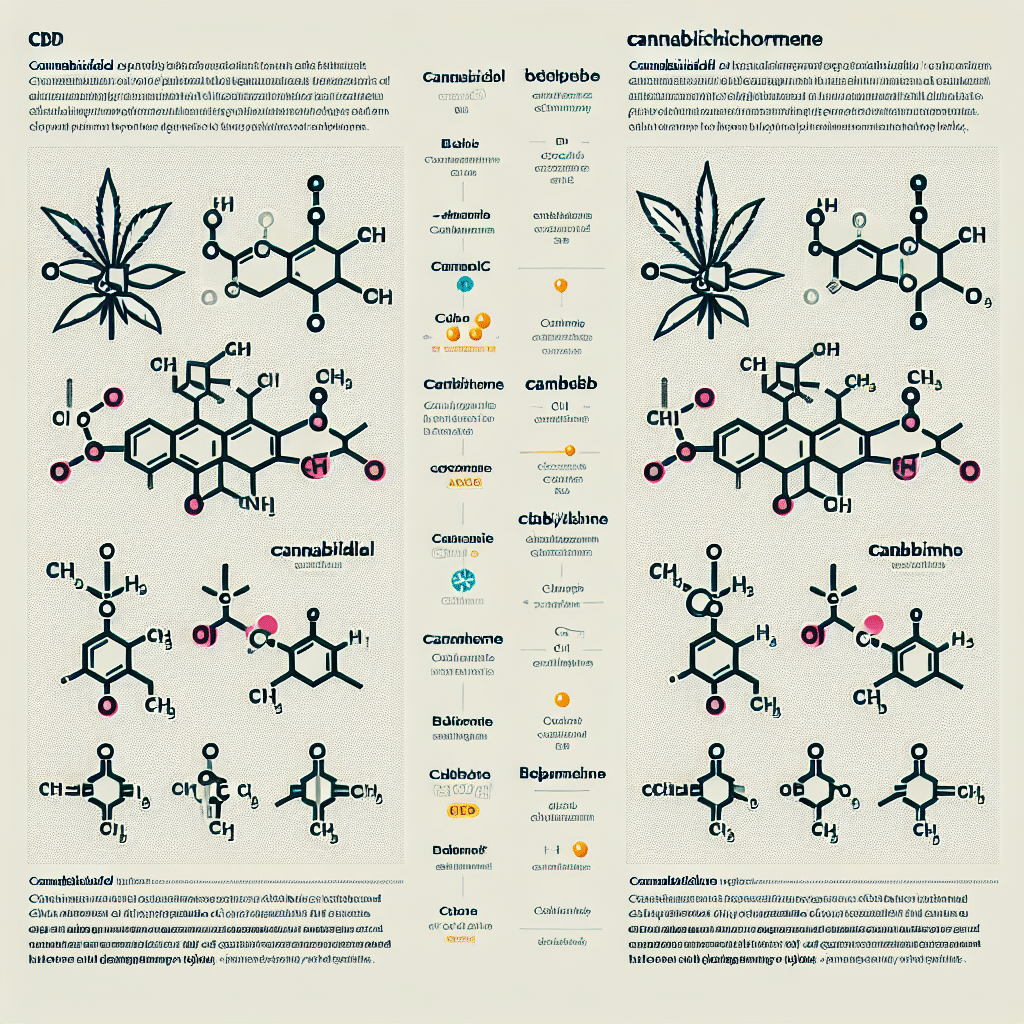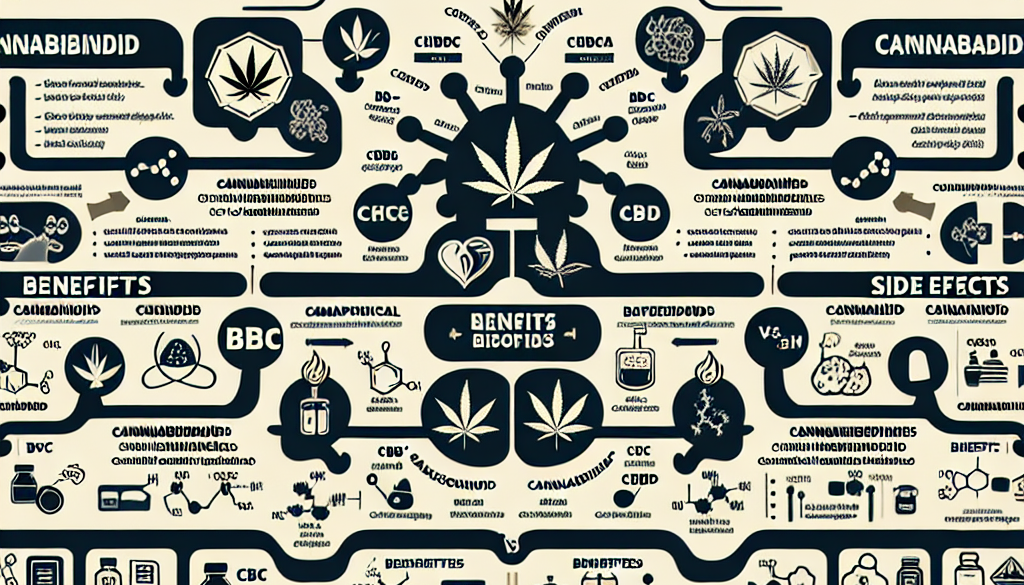CBC CBD Difference: What to Know
-
Table of Contents
- CBC vs. CBD: Understanding the Differences and Benefits
- Introduction to Cannabinoids
- What is CBC?
- What is CBD?
- Chemical Structure and Interaction with the Body
- Potential Health Benefits
- Legal Status and Availability
- Choosing Between CBC and CBD
- Conclusion: Key Takeaways on CBC vs. CBD
- Discover ETChem’s Protein Products
CBC vs. CBD: Understanding the Differences and Benefits

As the popularity of cannabinoids continues to rise, consumers are becoming more curious about the various compounds found in the cannabis plant. Two cannabinoids that often get mixed up are CBC (cannabichromene) and CBD (cannabidiol). While they share some similarities, there are distinct differences between the two that are important to understand. This article will delve into the CBC CBD difference, exploring their unique properties, benefits, and potential uses.
Introduction to Cannabinoids
Cannabinoids are a class of diverse chemical compounds that act on cannabinoid receptors in cells that alter neurotransmitter release in the brain. The cannabis plant contains over 100 different cannabinoids, with THC (tetrahydrocannabinol) and CBD being the most well-known. However, other cannabinoids like CBC are gaining attention for their potential therapeutic benefits.
What is CBC?
Cannabichromene (CBC) is one of the lesser-known cannabinoids found in the cannabis plant. It is non-psychoactive, meaning it does not produce the “high” associated with THC. CBC is believed to contribute to the overall effects of cannabis through a concept known as the “entourage effect,” where the combined effect of different cannabis compounds is greater than the sum of their parts.
What is CBD?
Cannabidiol (CBD) is a non-psychoactive cannabinoid that has gained massive popularity for its wide range of potential health benefits. Unlike THC, CBD does not produce intoxicating effects, making it an appealing option for those looking for relief from various conditions without the mind-altering effects of marijuana or certain pharmaceutical drugs.
Chemical Structure and Interaction with the Body
Both CBC and CBD have unique chemical structures that influence how they interact with the body’s endocannabinoid system (ECS). The ECS plays a crucial role in regulating a variety of physiological and cognitive processes, including pain sensation, mood, and immune system functions.
- CBC: CBC binds with other receptors in the body, such as the vanilloid receptor 1 (TRPV1) and transient receptor potential ankyrin 1 (TRPA1), both of which are linked to pain perception. When CBC activates these receptors, increased levels of the body’s natural endocannabinoids like anandamide are released.
- CBD: CBD has a low affinity for cannabinoid receptors and acts mostly through indirect interactions with the ECS. It is known to influence other receptors outside of the ECS, including serotonin receptors, which can affect mood and stress levels.
Potential Health Benefits
Both CBC and CBD have been studied for their potential health benefits, though CBD has been researched more extensively due to its popularity.
- CBC: Research suggests that CBC may contribute to the pain-relieving effects of cannabis. It is also being studied for its potential to promote brain health by encouraging the viability of developing brain cells, a process known as neurogenesis. Additionally, CBC has shown anti-inflammatory and antibacterial properties.
- CBD: CBD is best known for its potential to alleviate symptoms of anxiety, depression, and seizures. It has also been studied for its anti-inflammatory, neuroprotective, and analgesic properties. CBD has been used to treat a variety of conditions, including epilepsy, chronic pain, and insomnia.
Legal Status and Availability
The legal status of CBC and CBD can vary depending on the country and state. In the United States, the 2018 Farm Bill legalized hemp-derived CBD with less than 0.3% THC on a federal level, but state laws may differ.
- CBC: Since CBC is less well-known, its legal status is often tied to that of CBD. If derived from hemp, CBC is likely to be legal in places where CBD is permitted.
- CBD: CBD products are widely available in various forms, including oils, tinctures, capsules, and topicals. The availability of CBD has expanded rapidly, with products being sold online, in health food stores, and even in some pharmacies.
Choosing Between CBC and CBD
When deciding between CBC and CBD, consider the following factors:
- Intended Use: Determine what health issues you are aiming to address. While both cannabinoids have overlapping benefits, specific conditions may respond better to one over the other.
- Product Availability: CBD is more widely available and comes in a variety of product types. CBC products may be harder to find but are increasingly becoming more accessible.
- Legal Considerations: Always check the legal status of CBC and CBD in your area before making a purchase.
Conclusion: Key Takeaways on CBC vs. CBD
In conclusion, while CBC and CBD are both promising cannabinoids with potential health benefits, they differ in their chemical structure, interaction with the body, and the extent of their research and availability. Understanding these differences is crucial for consumers looking to make informed decisions about their health and wellness.
Discover ETChem’s Protein Products
If you’re interested in exploring the world of proteins and their benefits, ETChem offers a range of high-quality protein products. From marine to bovine collagen, ETChem provides a variety of options to suit your needs. Their products are perfect for those looking to enhance their health and wellness routines with reliable and effective protein supplements.
About ETChem:
ETChem, a reputable Chinese Collagen factory manufacturer and supplier, is renowned for producing, stocking, exporting, and delivering the highest quality collagens. They include marine collagen, fish collagen, bovine collagen, chicken collagen, type I collagen, type II collagen and type III collagen etc. Their offerings, characterized by a neutral taste, instant solubility attributes, cater to a diverse range of industries. They serve nutraceutical, pharmaceutical, cosmeceutical, veterinary, as well as food and beverage finished product distributors, traders, and manufacturers across Europe, USA, Canada, Australia, Thailand, Japan, Korea, Brazil, and Chile, among others.
ETChem specialization includes exporting and delivering tailor-made collagen powder and finished collagen nutritional supplements. Their extensive product range covers sectors like Food and Beverage, Sports Nutrition, Weight Management, Dietary Supplements, Health and Wellness Products, ensuring comprehensive solutions to meet all your protein needs.
As a trusted company by leading global food and beverage brands and Fortune 500 companies, ETChem reinforces China’s reputation in the global arena. For more information or to sample their products, please contact them and email karen(at)et-chem.com today.




